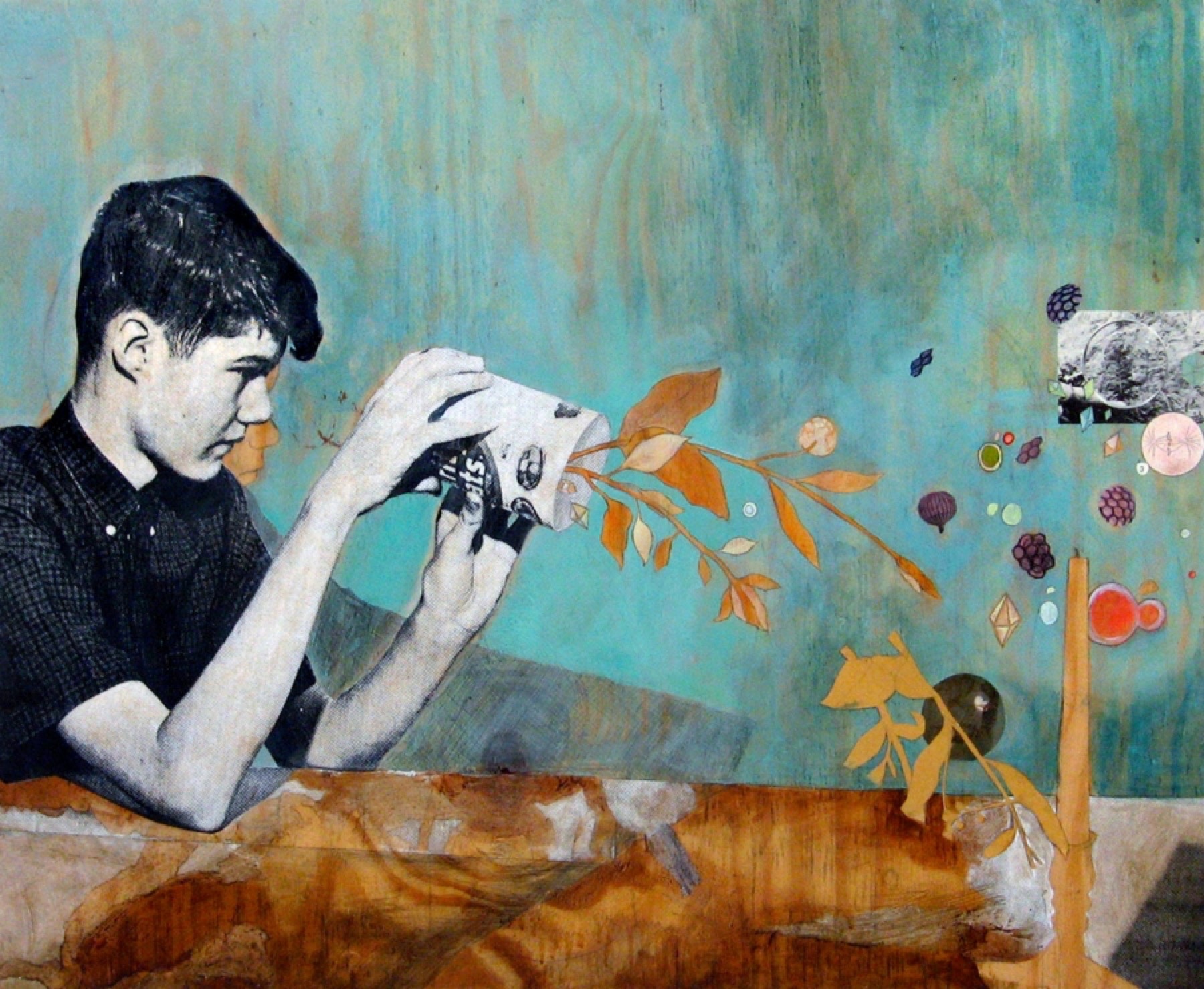
“The First Experiment in Visual Science” (2007), by Lina Tharsing
Three Poems
By Thomas Merton
When we are alone
Within the inner wood
Beyond the trackless ways
In elemental sleep
Though evening towns begin to burn
As copper as chrysanthemums
And the far cities flower
Twined in a map of incandescent wires
No voice from those abounding lights
Reddens the darkness of our rendezvous.
No radio has arrows that can find us
Winged after us with aimless jealousy into the night, our screen.
In the night of my penniless Genesis
The worlds are all too old:
And cities that enchanted me
Die like the clouds, the children of the sea.
For no one finds us anymore, Beloved,
Cradled in the sounding night, the new creation
That you have made for us alone.
Spencer Reece reads “Fragment”
Unable to embed Rapid1Pixelout audio player. Please double check that: 1)You have the latest version of Adobe Flash Player. 2)This web page does not have any fatal Javascript errors. 3)The audio-player.js file of Rapid1Pixelout has been included.
Pastoral
Earth’s amniotic atmosphere
(Wherein winged clouds arch over us)
Cleaves to the turning globe like flesh
To feed and light and cover us.
Blue, translucent and electric,
Wherein birds fly and glide and sing,
Beasts move, trees grow: all geocentric.
Air mantles us and binds us in
And carries words about the bone
Coordinating earth and air,
We line the ground, and plant the seeds,
And tend the plants, and graze the beasts;
And wander with them here and there
With sounds and gesture, words and prayer.
Spencer Reece reads “Pastoral”
Unable to embed Rapid1Pixelout audio player. Please double check that: 1)You have the latest version of Adobe Flash Player. 2)This web page does not have any fatal Javascript errors. 3)The audio-player.js file of Rapid1Pixelout has been included.
Poem
Thief and gambler, in the mind’s Algiers,
Bicker for a division, in a veil of shade.
Stillness explodes into a cloud of battlecocks.
Knife, with a bright tooth, bites the hiding heart.
Death caws, like copper, in the throat,
And the dry gambler’s dying like a daw.
The thief’s a flying shadow:
Slants up the wall with pockets full of coin,
And, in the wide sky, disappears.
But where the sun bullbellows in the mind’s Sahara,
His money shines on the waterless earth;
And in his sky of thoughts, his old desires
Fly back as black as carrion birds,
And gradual death begins to ring,
Like gongs, the sunstruck canyon’s quiet stones,
Until the nameless traveler learns in terror
His lidless eyes are open targets—
Where sudden night flings in her quiet spear.
He hears ring shut the clangorous gates of day,
And sees eternity hang open like a pit.
Meanwhile, the distant kites become companions,
Loving him for what was once his flesh.
Spencer Reece reads “Poem”
Unable to embed Rapid1Pixelout audio player. Please double check that: 1)You have the latest version of Adobe Flash Player. 2)This web page does not have any fatal Javascript errors. 3)The audio-player.js file of Rapid1Pixelout has been included.
Poems published with permission of the Trustees of the Thomas Merton Legacy Trust.
Special thanks to Spencer Reece for reading Thomas Merton’s poems. Reece, an ordained priest in the Episcopal Church, was a longlist nominee for the National Book Award for his poetry collection The Road to Emmaus (2013). His honors include fellowships from the Guggenheim Foundation, the Library of Congress, and the National Endowment for the Arts, among others.
Enjoy these poems? Subscribe to the Oxford American.


